

This film is an interesting one but it certainly doesn't hold up well. In a way, it's kind of hard to believe this was Helen Twelvetrees' most well-known role, which says something about her overall movie career. The story is highly overwrought and Twelvetrees is often given to hysterics in her portrayal of a woman who is desperate for two things-- to be loved, and to protect her daughter. It's all supposed to be virtuous and noble, but in the end, you can't really side with her, no matter how much the writers and performers want you to. The biggest problem facing a story of this kind is that she only has one scene with her infant daughter, and later after her divorce, she never sees her child again. So it's extremely unrealistic that she and her daughter would have any bond years later. When Millie bursts into the lodge to protect her daughter and ends up shooting the man who's been trying to seduce the girl, this is the first time they've even seen each other in all these years. And surely, the girl wouldn't even remember the woman who gave birth to her and abandoned her before she was able to talk. The courtroom scenes are just as preposterous. We are led to believe the jury is buying the prosecution's idea that Millie killed out of jealousy. But no evidence is even offered to substantiate such a theory. Then, the minute the daughter shows up near the end of the trial, the defense attorney suddenly has it all figured out. How does the defense attorney make this sudden leap in understanding everything? Millie is soon acquitted, and we learn that one of the jurors said he would have killed a man getting cozy with his daughter, too. Wouldn't Millie at least be found guilty of manslaughter?Of course, it sounds like I am picking this story apart...and maybe I am. But these contrivances are what make the film look silly today. My guess is that sophisticated and intelligent audiences found it silly back in 1931. If the performances had at least been grounded in some sort of reality, I could overlook the ridiculousness of the plot. But even Twelvetrees does not seem to know how to play this story with even one ounce of realism. The two women who play her girlfriends are the best performers in this picture, and that's because they're comic relief and allowed to be legitimately silly. Joan Blondell, one of the female friends, seems to be delivering her lines with a tongue-in-cheek approach, proving she is not taking any of this melodrama seriously. And as a result, she's the best thing in this picture-- the only real reason to see it.
... View MoreIt seems there was a curse on "Millie." Its four co-stars, Helen Twelvetrees, Lylian Tashman, Robert Ames and James Hall all died before they turned 50. As for the movie itself, its pre-code message is that all men are beasts who crave only one thing. The point is made through the saga of Millie Blake whom we first meet as a bashful bride on her wedding night (though even bucket loads of make-up can't hide the fact that Helen Twelvetrees is no teen-ager.) Nor is her paunchy husband an Adonis. Three years and a child later, she catches hubby canoodling with his mistress at a night club, files for divorce and valiantly (if stupidly) relinquishes the alimony she was entitled to. Plucky lass! From there on in, Millie fends off -- or gives in, depending on how you interpret the cutaways -- to a succession of over-age lotharios. But when one of them makes a play for her 16-year-old daughter, she has no choice. She has to shoot the dastard. By today's standards, Millie's sudsy exploits would be almost laughable. But by the standards of 1930/31, as movies were just learning to talk, it qualifies as an interesting (and sometimes downright entertaining) museum piece.
... View MoreMillie is a well-made, well-acted early talking picture, but like many of these "pre-code" melodramas, it is not going to seem very entertaining to most classic movie fans because it is so unremittingly grim and sleazy. It works overtime to portray life in early 20th century urban America as a nightmarish merry-go-round of boozing, empty partying and infidelity. Not a single strong, moral major character lightens the dark immorality and hedonism. All the men are cheaters, womanizers, child molesters, and drunkards. The women all victimized weaklings, whores, dumb broads, cats, and lushes. Nevertheless, the tone is ultimately cautionary rather than exploitive.The title character Millie (Helen Twelvetrees) starts as a timid, chaste small town girl who marries a well-off New Yorker (James Hall). A few years later, she is living in luxury, has a beautiful daughter, and a kind-hearted mother-in-law who adores her. But she is unhappy because hubby no long pays much attention to her. He is always going away "on business" -- oh! oh! Presently, while in a nightclub visiting with old home town pal Joan Blondell and Joan's equally slutty cohort Lilyan Tashmn, poor Millie catches hubby with his "business" -- a dame. She divorces the cad but inexplicably lets him have custody of the kid without even demanding a settlement. Any other woman would have socked it to the bum, but our Milly is a hopelessly weak, wavering, unstable type. Her modest job at a hotel tobacco counter gives her contact with lots of men, but only one who interests her, a reporter played by Robert Ames. She thinks he is a nice guy in spite of his guzzling too liberally of prohibition bathtub gin. After all, he is a reporter, and in old movies press men are expected to be drunks. Alas, he turns out to be two-timer as well, the cad! Helped along by the unwholesome influence of professional floozies Blondell and Tashman, Millie descends into wild partying, empty affairs, alcoholism, and a date with a murder trial.Even though this picture is loaded with drinking, promiscuity, infidelity, bawdy language and behavior, it may not be such a bad one for young people to view with proper supervision. The drinking and other dissipation is not glamorized as in other movies of the era, notably the first two Thin Man movies. Millie in fact shows exactly where such a decadent lifestyle leads -- how disgusting intoxication is, and the harm sleeping around and cheating does to oneself and others.Though much immorality and freewheeling lifestyle is shown in Millie, there is in fact no hint of a lesbian relationship between the floozies played by Blondell and Tashman as some others have alleged -- except in the diseased imaginations of the homophobes and homophiles who find such under every rock. The two girls are shown in the same bed together all right, but simply because they are renting a cheap room furnished with only one bed. It was common in those days for both male and female room mates on an economy budget to do so -- with no hanky-panky.Again Millie is a well-made movie with an engrossing story, but it is simply peopled with too many unredeemed losers to be enjoyable to those with a wholesome outlook. The only strong, moral character is Millie's mother-in-law (Charlotte Walker), but she is given only three brief appearances. If her character had been beefed up with a little more screen time, it would have helped.A final note. Several of the players in Millie met sad ends. Helen Twelvetrees' career ended early, mainly because the directors and studio bosses got fed up with her tantrums and her otherwise unstable personality. Forgotten for many years, she died of a drug overdose, an apparent suicide, at age 49. Lilyan Tashman died of cancer three years after Millie was released. As Millie's booze-soaked reporter boy friend, Robert Ames was apparently playing himself. A year later he died at 42 of -- get this --delirium tremens! Don't drink, kiddies.
... View MoreI liked this film - I was looking forward to seeing this as Helen Twelvetrees was Queen of the betrayal movie, so I had read.I especially like Helen Twelvetrees and think there should be more of her films available. She had a really ethereal beauty and was really suited to playing sweet young innocents ie "Bad Company". In "Millie" she was never a "sweet young thing" being more of a "hot little number", judging by the young fellow's comments at the drug- store. Millie is already on her way to becoming Mrs. John Maitland as the film begins - 3 years later she is a bored young wife and mother, whose husband is having a fling with another woman. Millie accidentally finds out while lunching with gal pals (Lilyan Tashman and Joan Blondell - who even share the same bed!!!) John (James Hall) is more concerned with not causing a scene rather than comforting Millie. Unlike one of the other reviewers I did not like her husband - he didn't seem sorry for his actions. She then gets a job at a cigarette stand and in the years that follow, rises up in the business world to become manager of her own concession stand. I actually think the film is about Millie's emancipation from a rich business man's bored wife to being an independent young woman. When she first leaves her husband, her pals ask her how she is going to survive. Millie is determined to do it on her own and not ask her husband for anything. She also decides to leave her daughter with him because she would not be able to give her the things she need.After fending off men right, left and centre, she finally falls for Tommy Rock (Robert Ames) a reporter who wants to marry her. Millie is determined not to marry again but is quite happy to move in with him. He then treats her the same way as her husband treated her. I really wasn't expecting that - his personality being of the "awh shucks" type. At least he was sorry - sitting down and crying his eyes out when she leaves him (after she wrecks his apartment!!!) She then decides to be free and easy with her love - even offending Joan Blondell, who has since married a respectable businessman. John Halliday plays James Damier, Millie's boss, who has always been keen on her but as time goes on transfers his attentions to Millie's daughter Connie. She is played by Anita Louise, who looks about 15 and absolutely gorgeous. I won't reveal the ending but it is quite melodramatic.Look out for Carmelita Geraghty - I think she plays the young woman who tells Millie that Tommy has been cheating on her and can prove it. She was a lovely actress who was always under used in my opinion.Recommended.
... View More